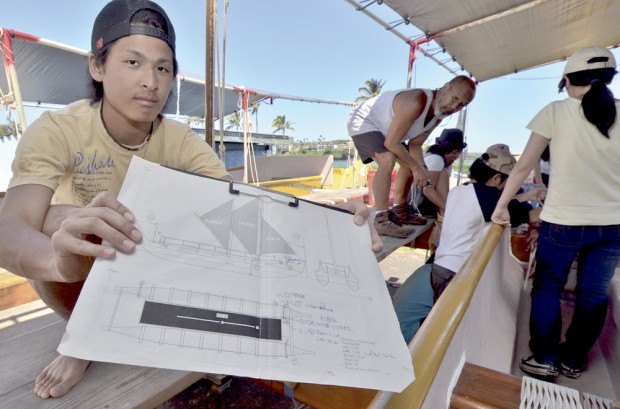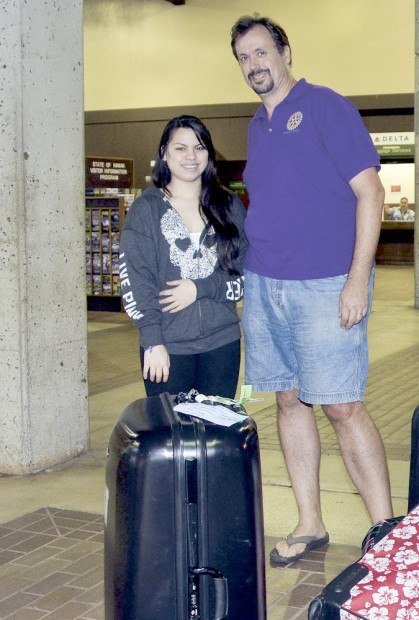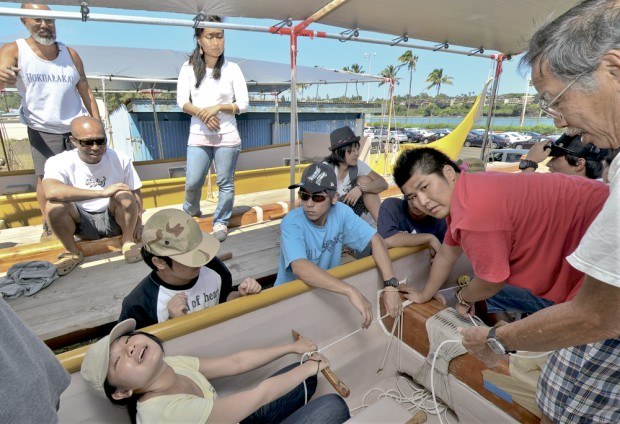LIHU‘E — Tom Gross, the Rotary Club exchange student coordinator, said all of the exchange students in Japan are being sent home following the earthquake and tsunami last week. Gross was at the Lihu‘e Airport Monday afternoon to meet Waimea
LIHU‘E — Tom Gross, the Rotary Club exchange student coordinator, said all of the exchange students in Japan are being sent home following the earthquake and tsunami last week.
Gross was at the Lihu‘e Airport Monday afternoon to meet Waimea High School junior Brandi Badua-Ramos who returned home with her grandmother, Mary Ramos, after experiencing the earthquake in Tokyo, Japan.
“We were out sightseeing because my grandma came to visit for a week, March 10,” Brandi said. “We were in a Hard Rock Café and felt the shaking. At first, we thought it was from the music, but it got harder and lasted for about five minutes.”
At Nawiliwili Harbor, Kyoki Ikeda, translator for nine students from the Toyama National College of Technology and the Toba National College of Maritime Technology, said they had no idea about the earthquake or resulting tsunami.
“We don’t watch television,” Ikeda said. “We were just sitting around talking after dinner, and did not know anything until Brian Yamamoto, one of the Kaua‘i Community College called. ‘If you’re not watching TV, you need to turn it on because there was an earthquake in Japan,’ he told us.”
That started a series of experiences for the student.
“We were at a place about 70 minutes by train,” Brandi said. “But the trains stopped running, and there were measures to save electricity.”
Mary said the earthquake struck about 2 p.m., Japan time, and by the time they got home it was about 3:30 a.m. the following day.
“It took us many hours to get back,” Mary said. “For the most part, we were just sitting and waiting. During that time, we did get to visit some karaoke places and that helped the kids because when they were singing, they kind of forgot how nervous they were.”
Back on Kaua‘i, Ikeda said once they found out about the earthquake, they were informed they would have to evacuate from Plantation Hale where the group is staying.
“We didn’t know what to do. We didn’t know where the holding sites were, so we just packed everybody in the cars and went to Dennis Chun’s house,” Ikeda said. “We spent the night there.”
On Friday afternoon, the nine Japanese students were assigned out to host families whom Ikeda said did a wonderful job in taking care of the students.
“The students had a very stressful weekend,” she said. “Although their families were not directly affected by the earthquake, they were unable to contact several of their friends for two days. That raised concern among them, but the host families did a wonderful job of caring for them.”
Ikeda said the people of Kaua‘i were wonderful because everywhere the students went, people stopped them to ask about their families and shared their sympathy for the situation.
“It made me really sad to see what was happening, and is happening in Japan,” said an airport security guard who stopped to help an incoming Japanese couple connect with the Kaua‘i Marriott shuttle. “I asked them if they were alright and they said their family wasn’t directly affected by the earthquake.”
Brandi faced the same situation in Tokyo, where she was not directly impacted by the earthquake or tsunami, but did not have a phone connection.
“There’s something good to be said about Facebook,” Gross said. “Brandi was finally able to get on Facebook and inform people that everyone was alright.”
Mary said with everything taking place about them, it reminded her of what she went through following the most recent hurricane on Kaua‘i in 1992.
“There is a big difference,” Gross said. “With the hurricane, we had warning it was coming; these people were caught totally by surprise. There was no warning.”
Brandi said it was an emergency situation in Tokyo because all of the water and food were sold out in stores, the trains stopped running, and there were two or three explosions from a nuclear plant about 185 miles from Tokyo.
“Every day, there would be radiation level reports on the news, and the evacuation zones (surrounding the plant) were increasing,” Brandi said.
Gross said due to this emergency situation, the exchange students were sent home.
“Our students are very torn right now,” Ikeda said. “On one hand, they are so excited because there is so much to learn and experience, while on the other hand, they share a big concern for what is taking place in Japan.”
Mary said the students were not ready to return home yet.
“There was a lot of crying goin’ on,” Mary said. “They did not realize their trip would be cut short in this manner. Even on the flight home, one of the flight attendants said she has been unable to make contact with any of her family members.”
Ikeda said the Japanese exchange students will continue their study tour, moving to the Big Island where they will meet up with crews from the Hokule‘a, Makali‘i and a team from Maui who wants to build a sailing canoe.
“We will return to Kaua‘i for one night before the students leave for Japan on March 24,” Ikeda said.
Gross said Brandi was the only exchange student from Hawai‘i to be in Japan this year. He added that there were no Rotary exchange students from Japan on Kaua‘i this year, although there may be students here under different programs.
William Arakaki, the Kaua‘i Complex Area superintendent, said he was unaware of any Japanese students in the Kaua‘i schools but would check on that with the individual schools.
• Dennis Fujimoto, staff writer and photographer, can be reached at 245-3681 (ext. 253) or dfujimoto@kauaipubco.com.




